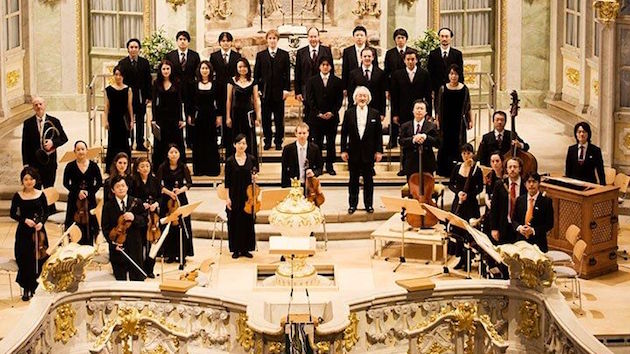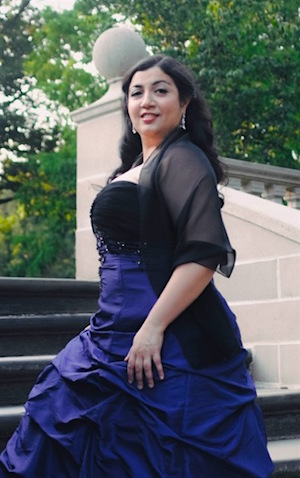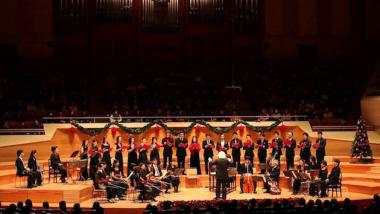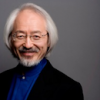
It’s hard to believe that while the Bach Collegium Japan was formed in 1990, and has earned any number of plaudits, the Tokyo and Amsterdam-trained Masaaki Suzuki made his San Francisco Symphony debut in February, 2016. This was after he had founded the early music department at the Tokyo University of the Arts, served on the choral conducting faculty at the Yale School of Music and Yale Institute of Sacred Music from 2009–2013, and received the Leipzig Bach Medal, the Royal Academy of Music Bach Prize, and, back in 2001, the Cross of the Order of Merit from the Federal Republic of Germany.
I had fantasized that if Saturday’s performance of three of J.S. Bach’s Christmas Cantatas at Davies Symphony Hall turned out as perfectly proportioned and engaging as I imagined, I might indulge in an analogy between the art of Japanese flower arranging and the miraculous balance of perfectly proportioned lines that Suzuki usually achieves.

So, how was it? In terms of sound alone, superb. Never have I heard a period-instrument woodwinds blend as sublime as that achieved by BCJ’s two flutes, two oboes d’amore, and two oboes da caccia. The sections’s uniquely warm, mellow transparency seemed destined to elicit a wide-eyed smile.
At the other end of the spectrum, I heard but one slight blooper from the sterling three-trumpet section led by Dave Hendry. First violinist Natsumi Wakamatsu’s solo displayed a lower range woodier and far more earthen-tinged than expected — again, a different sound than I’m accustomed to hearing from the orchestras of Philharmonia Baroque or American Bach Soloists. All told, the sound of Bach Collegium Japan’s 26-person orchestra was a refreshing and welcome ear-opener.

Its lightness and airiness were also highly appropriate for celebratory sacred cantatas whose music was, for the most part, “repurposed” from two, decidedly secular, royal birthday cantatas Bach had written in 1733, roughly a year before the six Christmas cantatas were unveiled during the 13-day Feast of Christmas that extends from Dec. 25 through Jan. 6. Although there is certainly a fair amount of holy reverence and gravity sprinkled through the six cantatas, which were intended for performance on different days, their overarching unifiers are joy and optimism.

Cantatas, of course, center on words, which in this case were sung by a 16-person chorus that included three male altos and one female alto. Each section incorporated one of the four soloists: soprano Sherezade Panthaki, countertenor Jay Carter, tenor Zachary Wilder, and bass Dominik Wörner.
Here is where the dominant problem arose. Wörner’s strong voice speaks with admirable authority, but it neither smiles when smiles are called for, nor recedes into the background when placed in an ensemble context. While his may not have been the only strong voice in his section, Wörner no doubt contributed to a curious bass dominance in a chorus whose sound is traditionally dominated by sopranos. Whenever the sopranos sang lower in their range, and produced a sound airier and more reedlike than pure, the basses boomed out over them.
The other three soloists possessed beautiful and strong voices, but they carefully reined in their volume to ensure that they would never dominate their sections. Panthaki possesses a unique voice whose singular glory lies in laser-sharp, vibratoless highs that burst into brilliant light high in the expanse of Davies.
While Panthaki’s blend with her fellow sopranos suggested that she’s more than capable of blending in duos and trios, her duet with Wörner in the Cantata for the Third Day of Christmas failed to congeal. Far more successful was her Second Cantata recitative as the Angel with a superb Wilder as the Evangelist. His voice is strong, warm when appropriate, and a joy to listen to. Although he seemed to tire at the end — the leading edge on his final contributions softened noticeably — his sound was consistently admirable.
Carter, too, was exceptional. The sound he produced at the start of his solo lullaby to the infant Jesus in the Second Cantata, “Schlafe, meine Liebster, geniesse der Ruh” (Sleep, my beloved, enjoy your rest), was as warm and nurturing as one could wish for. As with many countertenors who sing falsetto, he sounded a mite wooly and unfocused at the top of the range, but lower down, his power and beauty were world-class.
It was not a perfect performance, but it was certainly marvelous, and filled with the beauty that makes life worth living.



